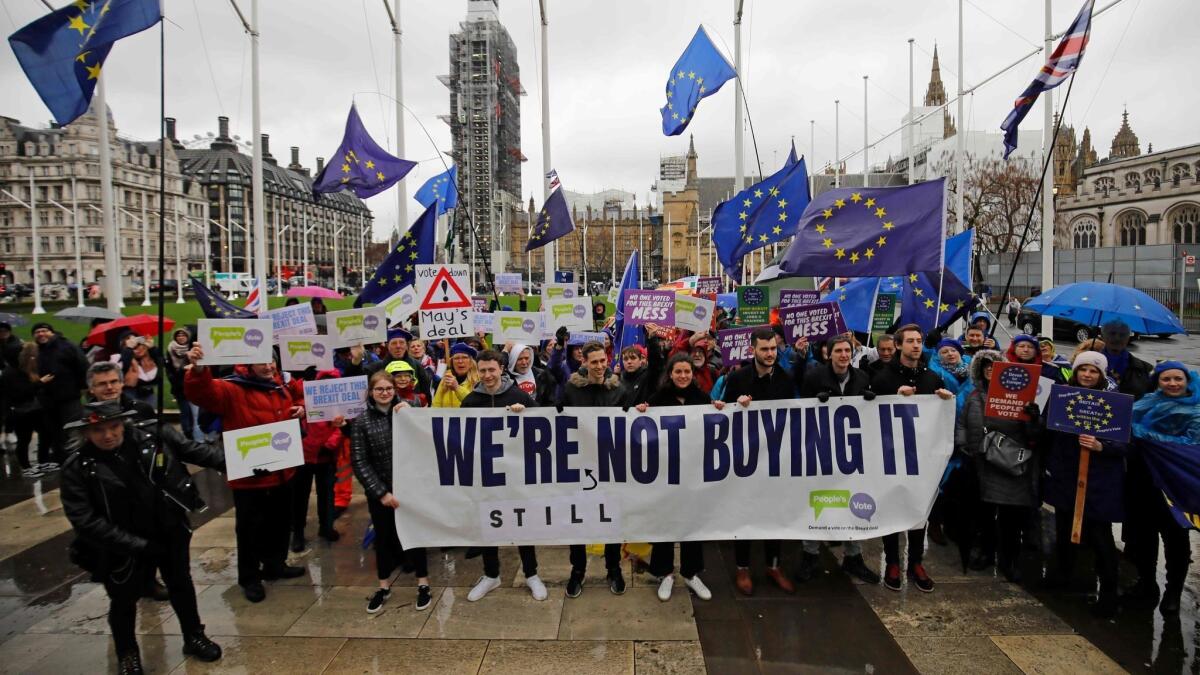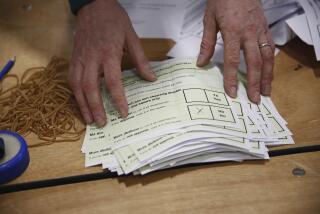Parliament rejects Theresa May’s Brexit deal, increasing turmoil in Britain

- Share via
Reporting from London — Britain was thrown into deeper political turmoil Tuesday after lawmakers rejected Prime Minister Theresa May’s Brexit divorce deal.
The country now faces the prospect of crashing out of its decades-long partnership with the European Union with no plan for managing the break.
The withdrawal agreement between May and EU negotiators was defeated despite the prime minister’s dash to the French city of Strasbourg late Monday to meet EU leaders and secure last-minute “legally binding” changes she hoped would win over a majority of lawmakers.
May had issued a stark warning to lawmakers before the vote: “There is only one certainty if we do not pass this vote tonight, and that is that uncertainty will continue for our citizens and businesses.”
The defeat by a vote of 391 to 242 leaves Britain in uncharted territory with politicians only able to agree that they disagree, with barely two weeks to go before it is scheduled to formally leave the EU on March 29.
Lawmakers are expected to vote again Wednesday, this time on whether they will support Britain leaving the EU without any deal, a move that is deeply unpopular given the economic damage it could unleash.
If that idea is rejected, they are then expected to vote Thursday on pushing back the March 29 deadline, but any extension would have to be approved by all remaining 27 EU members. Many EU members have grown increasingly bewildered and frustrated with British politics and would want some clear idea of what such an extension would achieve.
EU leaders appeared bewildered at the results and unsure where negotiations could go next.
The EU’s chief Brexit negotiator Michel Barnier said on Twitter: “The EU has done everything it can to help get the Withdrawal Agreement over the line. The impasse can only be solved in the #UK. Our ‘no-deal’ preparations are now more important than ever before.”
The EU had long stressed that the agreement on the table was the best, and only, one available.
May said she continued to believe that leaving the EU was the best outcome for the country and that the deal on offer was the best one.
“Let me be clear — voting against leaving without a deal and for an extension does not solve the problems we face,” May said.
Opposition Labor Party leader Jeremy Corbyn accused May of running down the clock in the hope of forcing lawmakers to vote for her deal.
“Maybe it’s time instead we had a general election,” he said.
The day leading up to the vote was a dramatic one of heated debates inside the House of Commons as well as much soul searching and deliberations behind closed doors.
Addressing Parliament, a hoarse May said members were faced with a clear choice: “If this vote is not passed, if this deal is not passed, then Brexit could be lost.”
She stressed that her deal delivered on what 52% of the British public voted for in a 2016 referendum: to leave the European Union and take back control of its laws, borders and money.
And the last-minute amendments she secured from European Commission President Jean-Claude Juncker provided the concessions that were sought.
But before the vote, Corbyn described those amendments as “all spin and no substance.”
“The reality is nothing has changed,” he said.
Speaking amid heckles and jeers from the chamber, May said she was putting forward a good deal that protected the rights of EU citizens living in Britain and British citizens living in the EU, gave businesses the time to adjust to the transition and replaced the free movement of people with a skills-based immigration system.
May argued the deal also ensured there would continue to be a strong security relationship between the U.K. and European nations and enabled Britain to strike its own free trade deals with countries outside the EU.
“It sends a message to the whole world about the sort of country the United Kingdom will be in the years and decades ahead,” May said. “A country that honors the democratic decisions taken by our people in referendums and in elections.”
The biggest stumbling block in negotiations was over the island of Ireland and how to ensure goods and services could continue to move freely once Britain left the EU.
It presents a unique challenge as the Republic of Ireland will remain an EU member after Brexit while Northern Ireland will leave the EU along with the rest of the United Kingdom. It will be the EU’s only land border with Britain, and any return to border checks could risk putting a strain on the hard-fought peace process that ended decades of bloody sectarian conflict.
Both the EU and Britain saw this as an absolute priority, but the wording of the backstop agreement — an insurance policy that would come into force only in the event no future trade deal could be reached by December 2020 — concerned lawmakers.
If future negotiations deadlock and the backstop were to come into effect, it would see the whole of the U.K. remain in an EU customs union until a permanent solution were found; Northern Ireland, however, would remain linked to some rules of the EU single market, which are more extensive.
Some critics, including the Democratic Unionist Party, or DUP, which May depends on for her majority in Parliament, said creating different trade agreements between Northern Ireland and the rest of Britain was unacceptable and sought more guarantees that this was a scenario that would never be realized.
Other Euroskeptics in May’s Conservative Party complained the backstop could tie Britain indefinitely to EU trade and customs regulations with no means of unilaterally withdrawing.
The prime minister put her original deal to the House of Commons in January and it was resoundingly defeated. She vowed to go back to the EU to secure more guarantees, seeking a legally binding guarantee from her EU counterparts that they would not trap Britain in the backstop.
U.K. Atty. Gen. Geoffrey Cox on Tuesday published his legal advice on the new agreement.
He said the new provisions agreed on in Strasbourg “reduce the risk” of Britain’s being held in the backstop arrangement indefinitely but do not legally prevent it.
Speaking later in the House of Commons, Cox stressed that the changes were “substantive and binding” and improved the deal, but said the issue was now a political judgment for lawmakers.
On Tuesday afternoon, the DUP released a statement announcing it could not back the revised deal: “In our view, sufficient progress has not been achieved at this time.”
Members of the right-wing European Research Group, which is made up of Conservative Party lawmakers, also indicated the changes had not gone far enough to win its support.
The pound plummeted Tuesday as it appeared that the tide of opinion was against May.
“We can’t carry on like this where you’ve basically got broken political parties that are divided,” said lawmaker Chuka Umunna, who recently quit the Labor Party to join a new independent group.
Umunna said he hoped Tuesday’s rejection of the Brexit agreement would increase support for a second referendum. There is currently “no leadership, no direction,” he said.
Boyle is a special correspondent.
More to Read
Sign up for Essential California
The most important California stories and recommendations in your inbox every morning.
You may occasionally receive promotional content from the Los Angeles Times.










